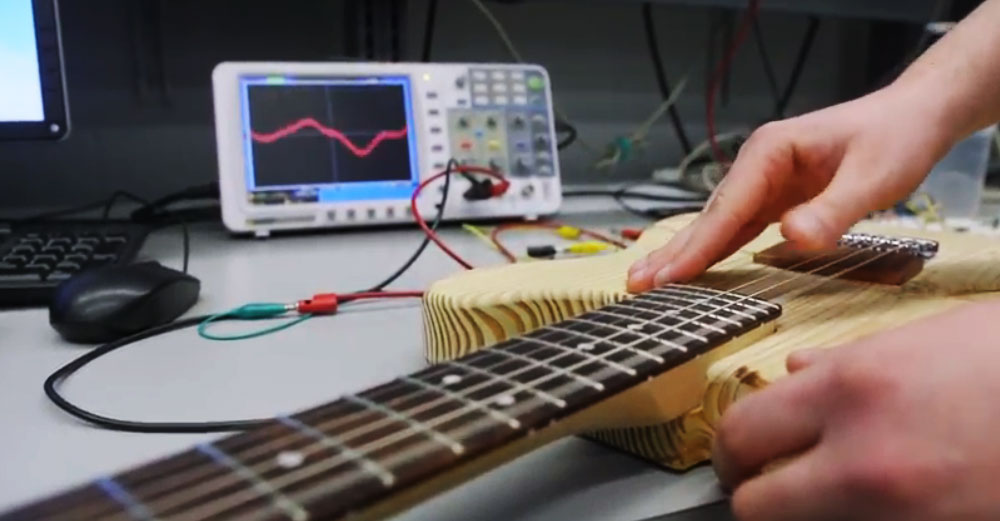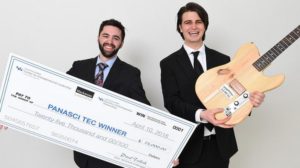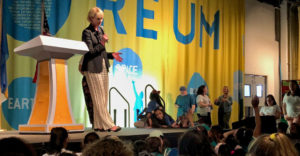
Phil Libin, CEO of Evernote, a mobile app designed for note taking, organizing, task lists, and archiving, once said the following about entrepreneurship, “There are lots of bad reasons to start a company. But there’s only one good, legitimate reason, and I think you know what it is: it’s to change the world.” When it comes to creating positive change through inventions and start-ups, SUNY supports our students in the pursuit of taking their ideas from the classroom to the outside world.
In fact, Chancellor Johnson shared in her inaugural State of the University System address that innovation and entrepreneurship are two of four themes of her vision for SUNY, and there are already ways for students to share in Chancellor Johnson’s vision.
All across SUNY, students participate in various competitions to showcase their work to the community and potential partners and investors. Recently, at the Henry A. Panasci Jr. Technology Entrepreneurship Competition, a team of electrical engineering and MBA students at University at Buffalo, Ryan Jaquin and Shane Nolan, and UB electrical engineering graduate Alex Schwartz, took first place for a technology called Bitcrusher that integrates digital sound effects directly into guitars. After that win, the team went on to take first place in the New York Business Plan Competition, which earned them a grand prize of $20,000 for their company.
As the news broke of the team’s success, we wanted to reach out and learn more about Bitcrusher and how it will positively affect musicians lives as well as the music industry. Thankfully, Ryan and Shane were kind enough to find time amidst all of their work in developing Bitcrusher to field our questions.
In your own words, what is Bitcrusher?
Shane: Bitcrusher’s vision is to re-imagine the electric guitar, fully embracing modern technology. Our device includes all of the elements needed to operate an electric guitar in a thin, low-profile package that mounts on the surface of the instrument. The device features digital control knobs and digital processing on board, giving the user endless effects right on the instrument. We will be offering our users a way to configure and customize their instrument using software, and users will be able to develop and distribute their own effects so that the Bitcrusher community can enjoy boundless creative opportunities to discover their own tone.
What inspired you to create Bitcrusher?
S: Earlier on in my studies at University at Buffalo, I decided I wanted to build a guitar, but lacking woodworking experience I began thinking of ways to make the guitar electronics smaller so that they can be fitted on the outside of the body of the instrument instead of carving cavities to accommodate them. This is how I conceived of our low-profile technology.
The next step that Ryan and I worked on together was taking full advantage of the compact digital technologies that are available today to increase the functionality of the instrument. From there, we built our first prototype in our senior design course. After that, we started to see that there might be some market value to what we were doing and started pursuing business plan competitions to get the idea off the ground.

How did your education at the University at Buffalo prepare you to succeed in the competition?
Ryan: Learning the presentation skills in the MBA program, as well as creating an effective presentation, really helped me succeed in the competition. My goal for the presentation was to make sure every time I presented that it improved. I also learned how to collect feedback and that feedback really helped better the presentation. Many experiences in the electrical engineering program helped us innovate and persevere in order to fulfill our dream of creating the device.
Some examples would be our circuit design course where we designed and built circuits on the breadboard and had to troubleshoot them and our senior design course, which is when we first created the device and got to present it at the senior design expo to a lot of engineers.
S: Our founding members all came from the department of electrical engineering. Ryan and I also went on to get our MBAs in the combined B.S. & MBA program. There were many educational experiences along the way at UB that contributed to our success; we feel that we couldn’t have done this anywhere else.
There were many times that our classroom experiences contributed to the progress of our startup: the senior design course where we built our prototype; or the eLab course in the school of management where we engaged in customer discovery, practiced our pitches, and developed our business plan.
Along the way, there were university entities such as Blackstone Launchpad, Center for Entrepreneurial Leadership, and University Business and Entrepreneur Partnerships who provided tremendous support. We were fortunate enough to engage in business plan competitions, network and learn new skills, and even access co-working space. The entrepreneurship ecosystem at UB runs very deep and there is a lot to discover as you advance your venture.
What was your favorite moment during the competition?
R: My favorite moment was right after we won our product category and had to immediately present again to the judges with all the adrenaline; it was so intense. I also loved listening to all of the other presentations because they were all so interesting and helpful in many different ways.
S: Presenting our pitch and engaging with the judges in the Q&A. It’s always so much fun to demonstrate our passion and share our ideas with an audience. The spirit of the competition at NYBPC was great.
What’s in store for Bitcrusher over the next year?
S: We will be very focused on developing our product. We are working with the local manufacturer SoPark and are accessing many amazing manufacturing resources in Buffalo to develop our product and bring it to its final stages. We will also be engaging artists for product testing and feedback. All of this will help us get to our first sales.
R: We are going to be working on the technical development of our product and will get a model out for people to begin to use and experiment with this year. We can’t wait and really want to get as much feedback as possible from the community on what they would do to improve the design even further. We also want to spread the word and hopefully get artists to get on board and help us market our product.
Any advice for fellow student entrepreneurs looking to invent something or create their own business?
S: Be persistent and be true to yourself. Don’t be discouraged if your market is competitive or there are high barriers to entry; if it’s your dream it’s worth pursuing. Ryan and I pursued this because this is what we are passionate about. That was our strategy from the beginning: to demonstrate our passion and expertise in the area we are most interested.
As long-time musicians, we are obsessed with this industry. We had an idea and made use of as many programs classes and competitions as possible, experienced some setbacks, and listened to and acted on criticism. College is an excellent time to pursue entrepreneurship.
R: In addition to what Shane said, I would tell students that nothing is out of reach when you are in college. You have access to so many resources and faculty that want to help you succeed in every way possible. If you have an idea or a passion at any stage and want to see it come to fruition, reach out to people in the school or community and see what they have to say. I can guarantee you will find someone who wants to help and can help make your dreams become a reality. Always be driven and never be afraid to act on an idea.
Learn more about the the design piece in the following video from the University at Buffalo School of Engineering and Applied Sciences:
Since the conclusion of the Business Plan Competition, Ryan and Shane have been hard at work growing their business. They recently rebranded their company into Algorhythm Technologies, Inc.




For a long time I’ve wanted to start up a business and have it grow and succeed. A lot of advice I hear is keep trying and keep working hard, so that’s what I plan to do! Thanks for sharing this as an encouragement to me.
That quote by the founder of evernote is perfect for this article. I agree 100%. I also think this is a great invention and has a good chance of changing the world.
Comming from a guitar player, this sounds amazing, no longer need to deal with pedals or expensive amps to have effects. What a great idea i hope this will be sold at guitar centers all around the country.